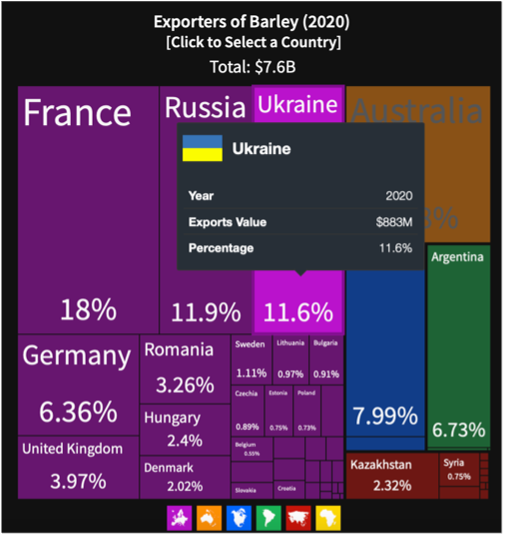It is important to understand the social, health, and political externalities as a result of Ukraine’s invasion from Russia. Upon listening to a recent podcast from The Economist, Money Talks: Grain damage, I was struck by the further resulting implications on the rest of the world. Noted specifically in this podcast was the high level of Ukrainian and Russian grain and fertilizer exports, threatening the world’s food supply through agricultural components and livestock feed. The two countries export over 20% of the world’s fertilizer and about 12% of all of the world’s calories, ranking in the top five of worldwide production. Beyond the ability to grow other forms of food from Ukraine and Russia’s expansive exports, other food’s production will see resulting declines. One major grain-utilizing industry sure to see subsequent production obstacles is the beer industry. With immediate sanctions already on Russian agricultural imports to the United States, this concern has already drawn attention from publications looking to the effect on consumers’ beer costs, warning producers of the cost of malted barley (beer’s crucial ingredient), and noting the resulting effects of beer availability in Russia, impacting consumer cost through the number of demanders and suppliers allowed in the market.
According to the Observatory of Economic Complexity (OEC), Ukraine and Russia combined export 23.5% of the world’s barley, with Ukraine following just behind the neighboring country’s level of exportation. Such a magnitude of world reliance on these two country’s barley are displayed to consumers when exports are threatened such as in times of conflict as seen now. Perhaps an even more daunting statistic to consider is that, according to Jim McGreevy, president and CEO of The Beer Institute, an estimated 20% of barley used in global beer production is imported from Ukraine. Meaning, one fifth of the main production component for the world’s beer will need to be replaced- and fast.
Production and supply shortages through ingredient deficiencies are often put onto the buyer of the beer in the end through decreased production and heightened costs. Beer production in Russia has been prominent in recent years, gaining recognition specifically for recent acquisitions such as the recent news of a Russian company’s purchasing of notable beer brand PBR. They still follow, according to Atlas Big, the production levels of Ukraine, the United States, and China, consistently reigning victor by producing the world’s largest volume of beer; about 27.6% of it. Consistent reliance on barley from Ukraine is prevalent as the OEC reports that about 26.5% of all barley imported to China is from Ukraine. Used in the large volume of beer as well as other uses, this source’s limitations show already through signs of threats to the beer industry’s producers. Russian companies have already announced hop shortages and export challenges amid sanctions. Less than 1,800 miles away, China’s production struggles show through increased reliance on alternatively sourced barley. Closer to home, breweries across the United States have announced price increases, inventory limitations, and other concerns surrounding production possibilities amid Ukrainian conflict. So, what can we – beer drinkers, makers, lovers, and researchers – do to support countries in need and maintain access to our favorite malted beverage? Brew and drink!
Being in Washington State, we have wonderful access to local breweries and brewing supply hubs. One of my favorites, Jon’s Homebrew and Wine Supply, has a consistent supply of Belgian, Austrian, and other barleys available to brew your own amidst a potential Ukrainian barley shortage. Beyond barley, Washington and Oregon’s hop farms like Coleman Agriculture and Yakima Valley Hops are important to support because no matter where their fertilizer comes from or the hops go, they’re growing and supplying an essential component to the brewing process. There are many other wonderful beer ingredient suppliers from across the world, making times of resource scarcity potential for opportunity. Of course, we can also all get a practice in the craft by brewing Drinkers for Ukraine’s Ukrainian Anti-Imperial Stout to show support.


Thanks for the shout-out!
Great post and I’ll also note that in talking to other farmers, especially folks with livestock, there have been some shifts in grain purchasing, replacing corn and other alternatives that have gone up in price with barley that would’ve otherwise been malted. Unfortunately, our brewers don’t have that ease of substitution.
Max Coleman, Coleman Agriculture
Whoa, hey! Thanks for the inside scoop! It’s interesting how much flexibility goes into the grain and use, especially on a larger/ commercial scale for cost reasons. A relatively elastic substitution brings a great benefit in times of need like that!
Double whoa, we’ll be brewing after a pickup from you on Tuesday! I was asked what “The Cookie” is and will make sure it makes it to you haha. Lager up! (But for now, happy fresh hop season!)